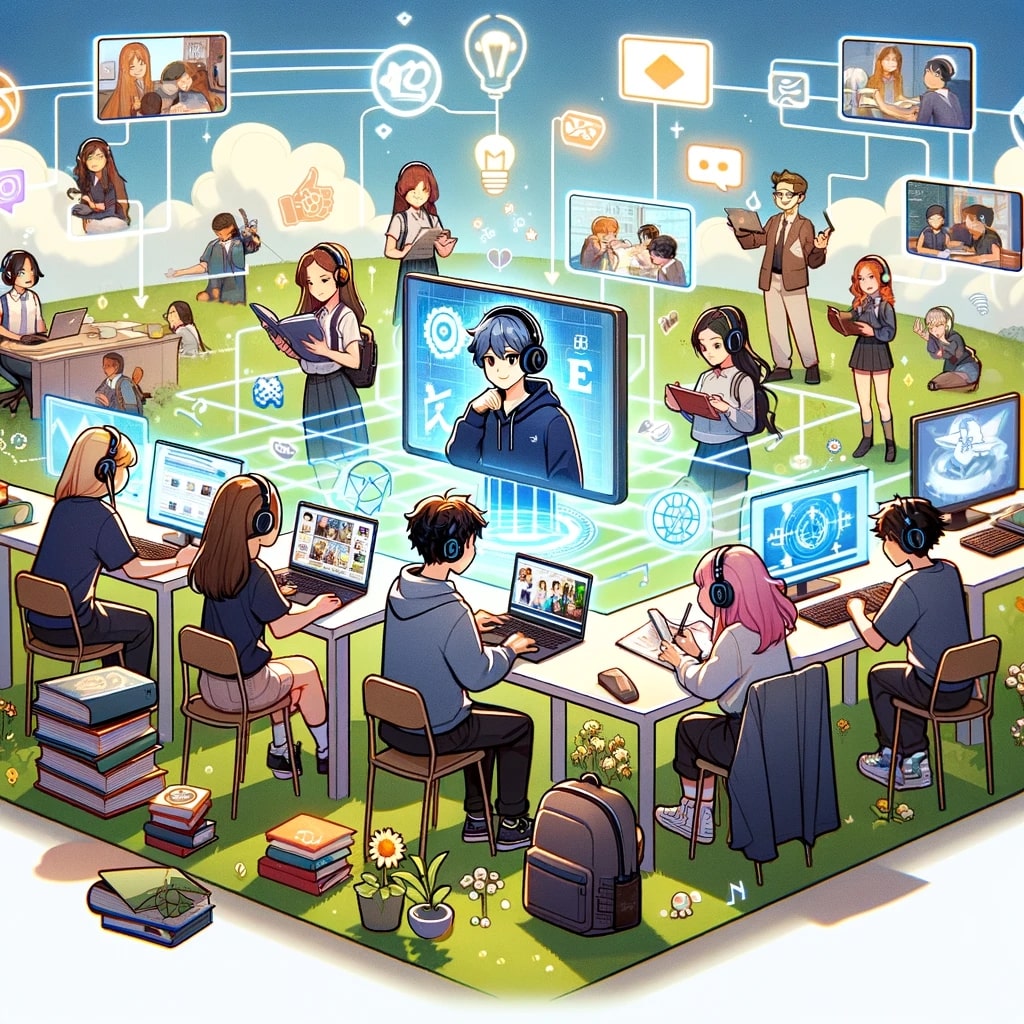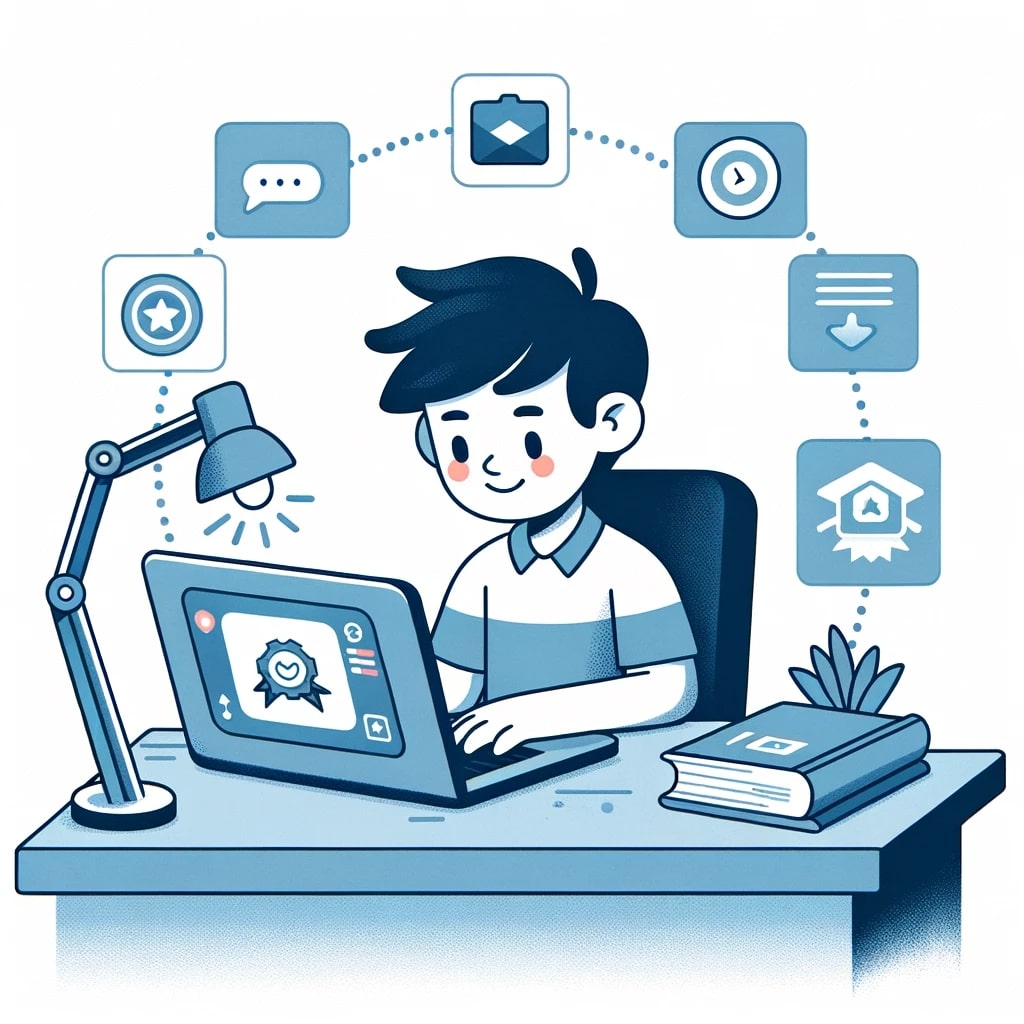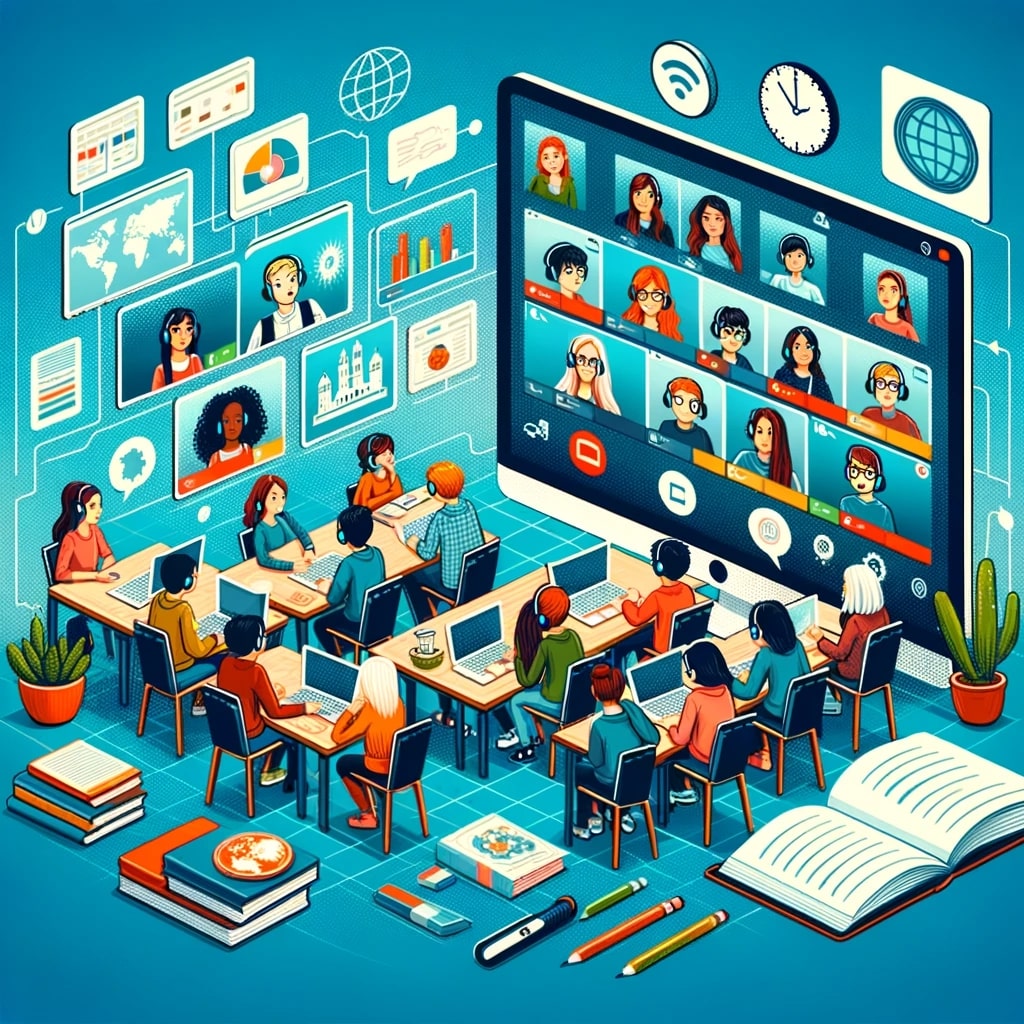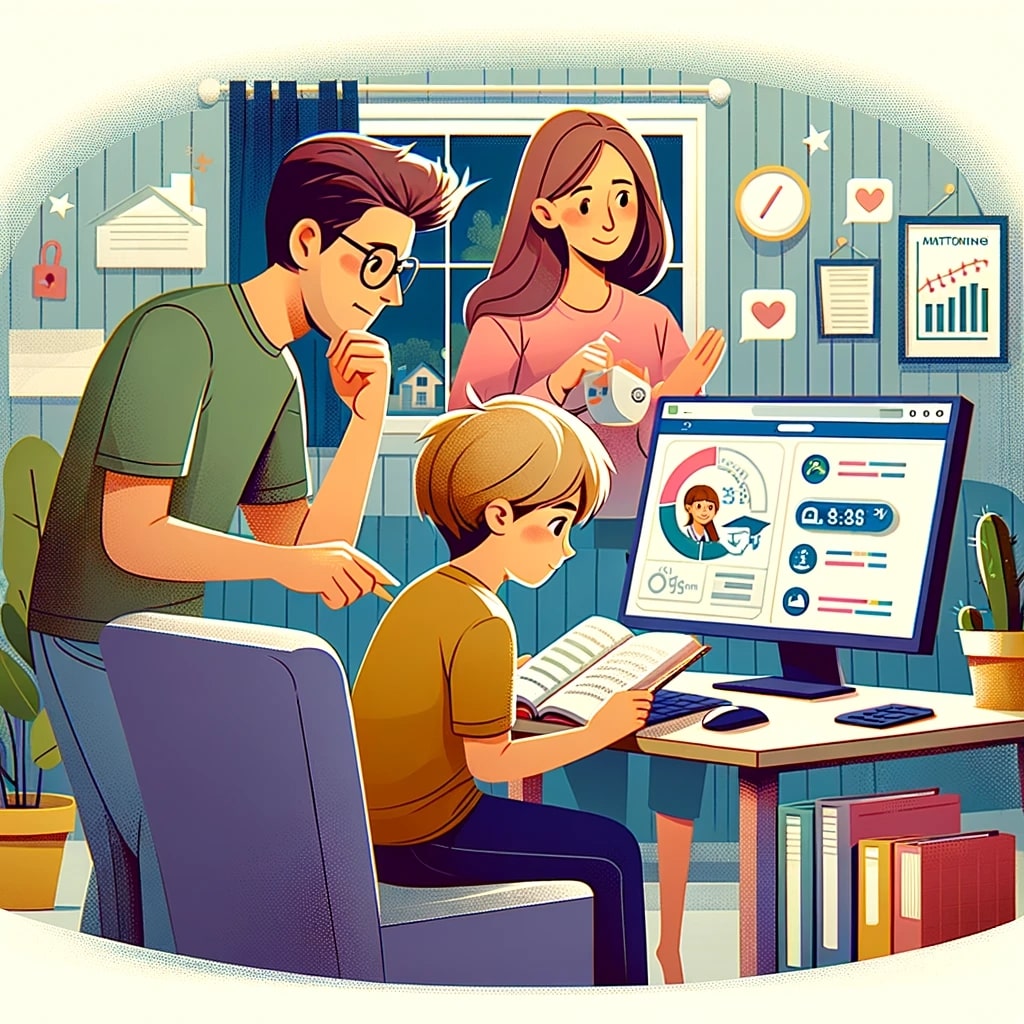The 7 Benefits of Learning Online You Didn’t Know
In the ever-evolving landscape of education, the UK has seen a significant pivot towards online learning.
A telling statistic reveals this trend: A recent study found that in the UK, the number of students enrolling in online courses has increased by over 50% in the past few years. This surge is not merely a response to contemporary challenges, such as the pandemic, but a reflection of a deeper, more systemic shift in educational preferences and methodologies.
Now – What are the Benefits of Learning Online?
1. Tailored Learning Paths – No More Confusing Lessons at School ✅
Online learning revolutionises education by providing custom educational paths that adapt to individual learning speeds. Traditional classrooms often follow a one-size-fits-all approach, which can be challenging for students who don’t align with the average pace of the class. Online education, however, offers a solution to this by allowing learners to progress through material at their own speed, ensuring that no one is left behind or unchallenged.

Flexibility for Diverse Learning Needs
The flexibility of online learning is key for students with diverse educational needs. It accommodates different learning styles, from visual and auditory to kinesthetic, by offering varied resources like videos, podcasts, and interactive simulations. This diversity not only caters to individual preferences but also makes learning more engaging and effective.
Access to a Wide Range of Resources
Online platforms provide access to a vast array of resources, enabling students to find materials that resonate with their learning style. Whether it’s
- detailed explanations,
- summary notes,
- interactive quizzes,
- or forum discussions, these resources make learning more accessible and less intimidating.
The ability to choose from such a wide range of materials empowers students to take control of their learning journey. For instance, Quizlet can be one of the best revision platforms, because it provides all of the above.
2. Gamification of Learning – Integration with Gaming and Interactive Platforms 🎮

In the digital age, gamification of education is transforming how students engage with learning material. This approach integrates game mechanics into educational content, making the learning process more interactive and enjoyable. Through educational gaming, complex concepts are broken down into manageable and engaging activities, enhancing both understanding and retention.
Enhancing Engagement with Interactive Learning
Interactive learning through game-based platforms 🕹️ offers a dynamic alternative to traditional learning methods. These platforms often include elements like
- point scoring,
- competitive leaderboards,
- and achievement badges, which provide immediate motivation and feedback.
This form of engagement is particularly effective in maintaining student interest and participation, especially for topics that might otherwise seem daunting or uninteresting.
The Impact of Game Mechanics on Learning
The incorporation of game mechanics in learning platforms is more than just fun; it’s a strategic educational tool. 🎲
These mechanics tap into the natural human desire for competition and achievement. For instance, completing levels or earning rewards for mastering a new concept can give students a sense of accomplishment and progress, which is crucial in maintaining motivation in a virtual learning environment.
Research has demonstrated that gamification centred around challenges can enhance student performance by approximately 89.45%, a significant improvement over traditional lecture-based teaching methods. Furthermore, there was an overall increase of 34.75% in student performance.
Game-Based Learning Platforms and Their Advantages
Game-based learning platforms take this concept a step further by offering an immersive educational experience. 🎓
These platforms use storytelling, challenges, and interactive problem-solving to teach and reinforce learning. By simulating real-life scenarios, they help students apply knowledge in practical contexts, preparing them for real-world challenges.
3. Global Networking – Making Friends While Studying 🌍
Online learning has transcended physical boundaries, creating global classrooms that connect children from different cultures. This international aspect of online education fosters a unique environment for cultural exchange, enriching the learning experience by exposing students to diverse perspectives and ideas.

Benefits of International Online Education
International online education brings together students from varied backgrounds, encouraging them to share their unique experiences and viewpoints. 🤝
This cultural melting pot not only makes learning more interesting but also prepares students to operate in a global environment. The skills gained from this exposure, such as cross-cultural communication and adaptability, are highly valued in the modern workforce.
“Cross-cultural communication fosters trust and facilitates collaboration. The emphasis is on providing the appropriate response rather than the appropriate message. When two people from different cultures meet, they not only have distinct cultural backgrounds but also have various turn-taking systems.”
Virtual Student Interactions
Virtual student interactions in online learning environments are more than just academic exchanges; they are opportunities for personal growth and global networking. These interactions often lead to lasting friendships, further breaking down cultural barriers and fostering global harmony. 🌐
4. Eco-Friendly Education – Sustainability Really Matters 🌱

Online learning is not just revolutionising education; it’s also making it more sustainable. This digital approach significantly reduces paper use, making learning more eco-friendly. In an era where environmental consciousness is paramount, online education stands out as a green alternative to traditional schooling methods.
The Shift to Paperless Learning
One of the most notable environmental benefits of online learning is the move towards paperless education. A recent study revealed that UK schools annually spend close to half a billion pounds on paper, an amount that could equate to purchasing 3 million Chromebook devices.
“Today there’s simply no need to spend this amount of time and money on paper. It creates admin for the sake of admin, is wasteful and puts additional strain to the environment.”
Says Ieva Kulikovska on The Access Group
Digital textbooks, online assignments, and e-resources eliminate the need for physical books and paper, thereby reducing deforestation and paper waste. This shift is a crucial step towards a more sustainable and responsible educational model. 📚
The Bigger Picture of Green Education
Green education goes beyond immediate environmental benefits. It also educates students about sustainability, embedding eco-conscious values into the learning process. Online learning, by its very nature, serves as a constant reminder of the importance of environmental responsibility, preparing students to be conscientious global citizens. ♻️
5. Learning Online Can Be Better for the Mental Health of Students 🧠
The world of online learning offers unique opportunities to support the mental health of students. In an educational landscape where stress and anxiety are increasingly prevalent, online platforms provide flexible and less pressure-filled environments. This can be particularly beneficial for students who find traditional classroom settings overwhelming or stressful.

Stress Management in Education
Online learning can play a pivotal role in stress management. The flexibility to create one’s own schedule and learn at a comfortable pace can significantly reduce the pressure often associated with tight deadlines and packed timetables. Students can take breaks when needed and approach learning in a way that aligns with their personal stress thresholds. 📚
Tailored Online Learning Support
Many online learning platforms offer resources specifically aimed at supporting student well-being. These might include access to mental health resources, tips on maintaining a healthy study-life balance, and forums where students can share experiences and advice such as The Student Room.
The Role of Community and Connection
Despite being physically apart, online learners can still experience a strong sense of community and connection, which is vital for mental health. Forums, group discussions, and virtual meet-ups can help students feel less isolated, providing spaces where they can connect, share experiences, and support each other. 💡
6. Parental Involvement and Monitoring – Easily Done 👨👩👧👦

In the digital age of education, online learning platforms have opened new avenues for parental involvement in their child’s learning process. These platforms offer various tools and features that enable parents to be more engaged and informed about their child’s educational progress without being intrusive.
Education Monitoring Tools for Parents
Many online learning systems include monitoring tools that allow parents to track their child’s progress, view assignment submissions, and check grades. These tools provide a window into the child’s academic life, enabling parents to stay updated and offer support where necessary. Importantly, this visibility helps parents strike a balance between being involved and respecting their child’s independence. 👪
Fostering a Supportive Learning Environment
Parent engagement is crucial in creating a supportive learning environment. Online platforms often have features like
- parent-teacher communication channels,
- regular progress reports,
- and notifications about upcoming assignments or events. 📚
These features facilitate an open line of communication between parents and educators, ensuring that both parties are aligned in their efforts to support the student.
7. Learning Beyond Academics – What Does the Internet Teach Parents and Students? 🌐
The internet and online platforms are redefining the boundaries of education, extending learning beyond traditional academic subjects to encompass life skills, ethics, social skills, and citizenship. 📚 This expansion is crucial in preparing both parents and students for the complexities of modern life.

Life Skills Education Online
Online platforms offer a plethora of resources for life skills education. These include
- courses and interactive modules on critical thinking,
- problem-solving,
- financial literacy,
- and health and wellness.
Such skills are essential in navigating daily life and ensuring personal and professional success.
Online Ethics Education
With the digital world becoming an integral part of our lives, online ethics education has become more important than ever. 💻 Platforms dedicated to teaching internet safety, digital citizenship, and the ethical use of technology help students understand the responsibilities that come with being a netizen. This education is vital in fostering a safe and respectful online community. Check out fair use of ChatGPT for students.
“There are many ethical issues surrounding technology that are a matter of student behavior and it is, therefore, important to also teach students technological (and especially Internet) ethics and etiquette.”
Says David Wood on Study.com
Developing Social Skills Virtually
Social skills development is another area where online platforms excel. Through collaborative projects, discussion forums, and group activities, students learn to communicate effectively, work in teams, and resolve conflicts. These platforms provide safe spaces for students to practice and develop these skills, which are critical for both personal and societal interactions. 🌍
What Does the Future Entail for Education? – Is Learning Online the Next Big Thing? 🚀
As we peer into the future of education, it’s clear that online learning is not just a fleeting trend but a fundamental component of educational evolution. This mode of education, blending traditional and contemporary advantages, is redefining the learning landscape, making it more accessible, flexible, and inclusive than ever before.
Modern learning is increasingly becoming synonymous with online education. With its ability to adapt to the rapid changes in technology and society, online learning is at the forefront of educational foresight. It prepares students not just academically but also equips them with vital life skills like digital literacy, critical thinking, and global citizenship.
The foresight in education now involves leveraging technology to create a globally connected learning environment. Online learning breaks down geographical barriers, bringing together a diverse mix of cultures and ideas, fostering global understanding and collaboration.
Try the beauty of online learning with Edumentors – emerging online tutoring platform helping thousands of students throughout the UK.








